
In the age of information overload, sharing knowledge while collaborating effectively is like finding a needle in a haystack. This is due to the ever-increasing complexity of industries and the rapid proliferation of information.
Knowledge sharing platforms can fix this problem, making finding the correct information in a company easy. They help you streamline sharing information, ideas, and expertise, facilitating collaboration, better decision-making, and boosting productivity.
Deloitte has found that companies with effective knowledge sharing programs had a 34% higher productivity rate than those without such programs.
In my experience, a quality knowledge sharing platform should allow team members to share what they know so others can find information quickly and without much effort.
In this article, I’ll list the 10 best knowledge sharing platforms that have the right mix of features to help you share knowledge better.
| Best Knowledge Sharing Platforms | Best For | Pricing |
| ProProfs Knowledge Base | Small to mid-size teams looking for creating help sites, user manuals or private knowledge base |
15-day free trial. Paid plan starts from $49/author/month |
| Nuclino | Startups and small teams looking for an intuitive wiki solution | Free plan is available. Paid plan starts from $5/user/month |
| Google Workspace | Small businesses looking for cloud-based collaboration tools | 14-day free trial. Paid plan starts from $6/user/month |
What Is a Knowledge Sharing Platform?
A knowledge-sharing platform is a centralized online repository of essential company information such as work processes, standard operating procedures, policies, and much more. The platform makes information access a breeze as employees can find everything they need from one single location.
Such a platform can help you build a knowledge-sharing culture in your organization, make information easily discoverable, and turn your workforce into a productive powerhouse.
Top 10 Knowledge Sharing Platforms in 2024
Having used and researched multiple knowledge sharing platforms over the years, I can say that the best ones are those that are user-friendly, intuitive, and easy to navigate.
The following list is based on my experience using most of these knowledge sharing software tools, browsing through their reviews and ratings, and going through hours of demo videos. Also, some of these tools were recommended by my colleagues and friends in the industry.
1. ProProfs Knowledge Base – Best for Creating Help Sites, User Manuals or Private Knowledge Base
Starting with what I chose for my company – ProProfs Knowledge Base.
It helps you create, organize, and share online documentation with your employees. It enables multiple authors to work together, track article changes, and share feedback on one platform.
It has a private or public group feature that enables members to communicate, collaborate, ask, and answer questions.
It is easy to use and suits both technical and non-technical users, as it requires no coding skills. It makes creating and managing training documentation, company wikis, and training materials easy with its AI text editor with pre-built prompts and filters.
Its insightful analytics and reports show you what users search for, failed searches, and improvement areas.
One of my favorite features of ProProfs Knowledge Base Software is its employee handbooks, which helped me communicate my company’s policies, work protocols, code of conduct, mission, and vision to new and existing employees.
What you’ll like:
- Internal comments functionality to provide feedback, collaborate & discuss with other users
- Quick creation of insightful knowledge base articles with pre-built templates
- Rich integration with CRM tools like Salesforce and Zendesk and the G-suite, including Google Fonts and Google Translate to enhance self-service
What you may not like:
- The 15-day free trial may not be enough for some users
- The feature set may take some time getting used to
- Slightly complex context-sensitive help
Pricing:
A 15-day free trial is available. Paid plan starts from $49/author/month.
2. Nuclino – Best for Creating Wikis
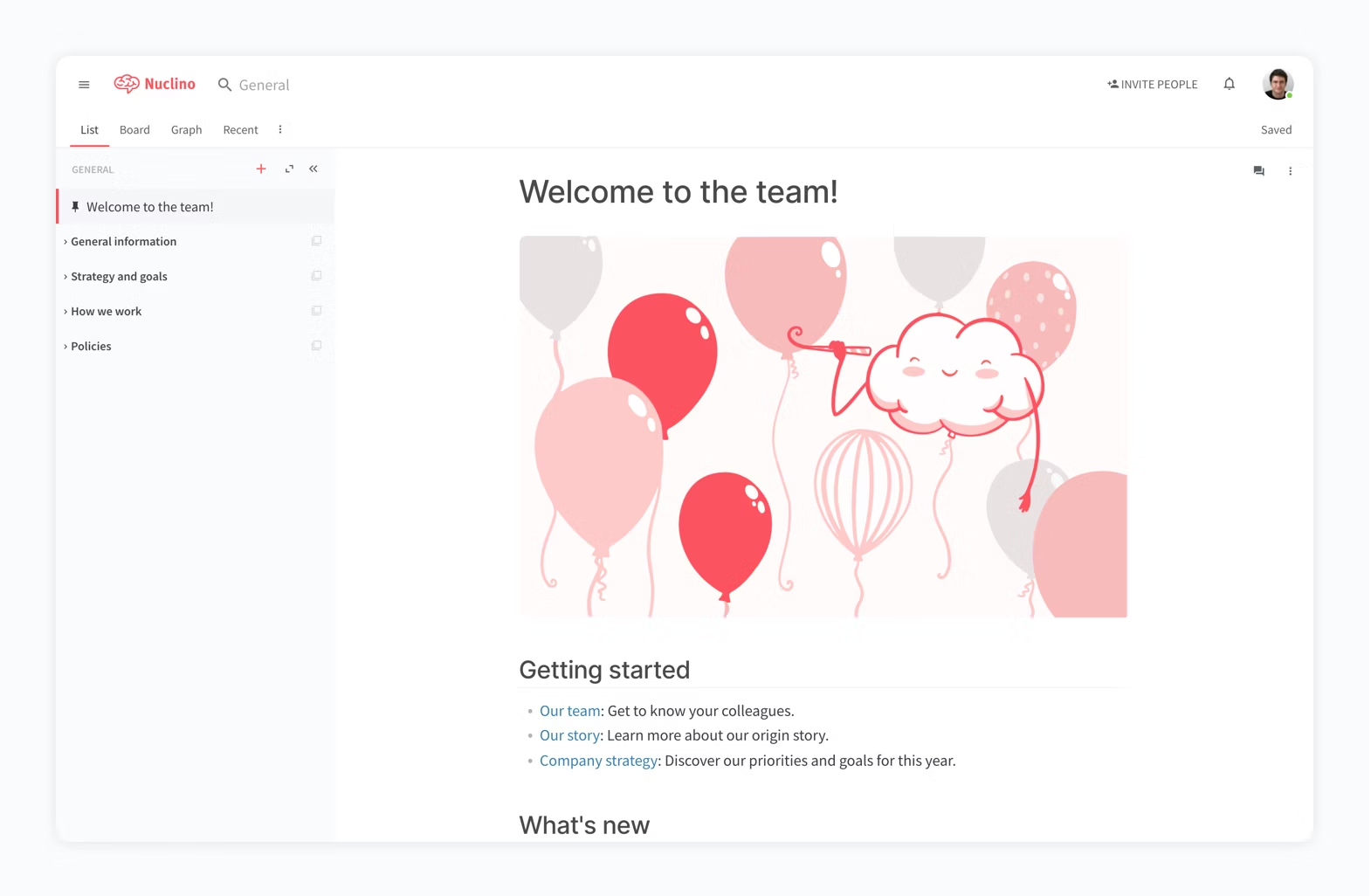
Nuclino is my top recommendation if creating insightful wikis is your priority.
Nuclino’s wiki creation feature helps you to create a wiki that keeps your team’s knowledge organized and accessible. It enables you to design and organize content using items (wiki pages) grouped in collections (wiki categories).
Every item can be added to multiple collections, making it convenient to locate relevant information. Collections can contain infinite nested sub-collections, helping you to create a deep hierarchical structure.
The platform’s real-time editing and commenting features kept everyone in my team on the same page, facilitating swift decision-making and knowledge sharing.
What you’ll like:
- Smart GUI – the same text style is enforced on all the pages helping save time
- Real-time editing and commenting features that enhance team interaction
- The ability to tag/hyperlink to other tabs on the same Nuclino page (as well as tag users)
What you may not like:
- Not ideal for organizations with highly complex data management needs
- Lack of additional data organization and analytics features
- Lack of advanced formatting options
Pricing:
A free plan with limited features is available. Paid plan starts from $5/user/month.
3. Google Workspace – Best for AI-Powered Business Insights
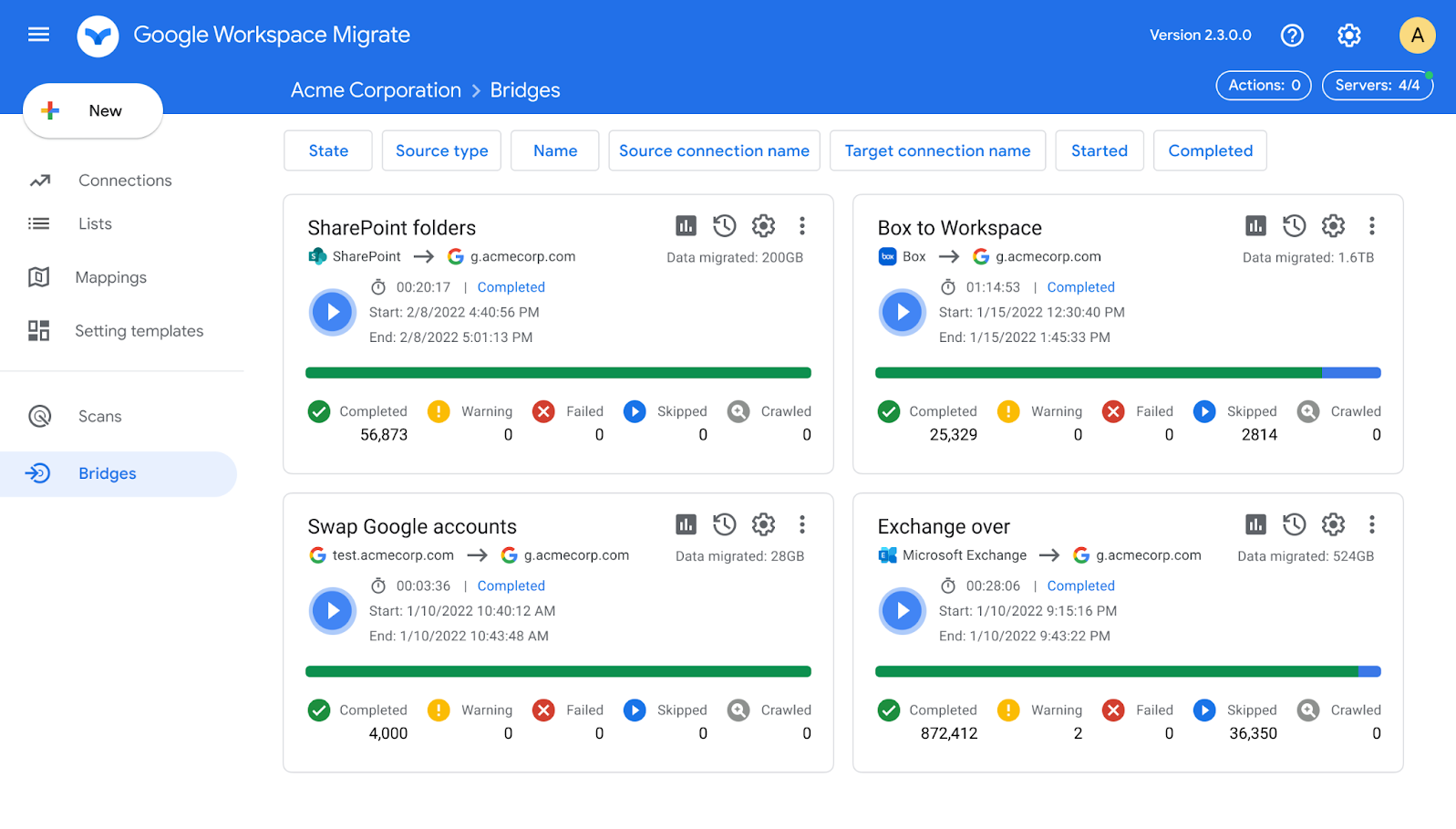
Google Workspace provides AI-powered business insights to help you make informed decisions and improve your workflows.
It enables you to create, edit, and share documents, spreadsheets, presentations, and more in real time.
Its Duet AI helps you write, visualize, organize, and connect more meaningfully. You can analyze and act on their data in Sheets faster than ever with automated data classification and the creation of custom plans.
It is ideal for businesses seeking data-driven insights and seamless integration with Google’s AI capabilities.
What you’ll like:
- Access to data-based insights powered by Google AI
- Smooth integration with a range of Google apps like Google Docs, Sheets, Slides, Drive, Meet, and Chat for collaboration and knowledge sharing
- The auto-delete feature which deletes the media after specific period
What you may not like:
- May be overwhelming for users who prefer a more straightforward, more streamlined experience
- Extensive reliance on Google’s infrastructure may raise data privacy and security concerns
- Pricing structures can be complex, and costs may vary depending on usage and features
Pricing:
Paid plan starts from $6/user/month.
4. Bloomfire – Best for Seamless Content Curation and Sharing

Bloomfire is an intuitive content curation and sharing platform. It is an ideal choice for businesses seeking to enhance knowledge sharing.
Whether you’re a team looking to compile and distribute resources or an educator aiming to improve learning, Bloomfire won’t be seen as lacking.
Bloomfire’s robust content curation tools helped me easily compile and organize knowledge resources with ease. Its user-friendly and intuitive interface facilitated active participation and collaboration, nurturing a sense of community among my team.
I liked how effortlessly its advanced analytics helped me track engagement and continuously improved my knowledge sharing strategy.
What you’ll like:
- User-friendly interface to facilitate collaboration among your teams
- Intelligent search tool and tags to quickly find the information needed
- Rich content library that includes live shows, articles, notifications of new comments or posts, and the ability to organize by tags or groups
What you may not like:
- Customization of posts and layout requires plenty of efforts
- Requires better control over login credentials
- No feature to use filters within groups when using the search function
Pricing:
Paid plan starts from $25/user/month.
5. Confluence – Best for Streamlined Team Collaboration & Documentation
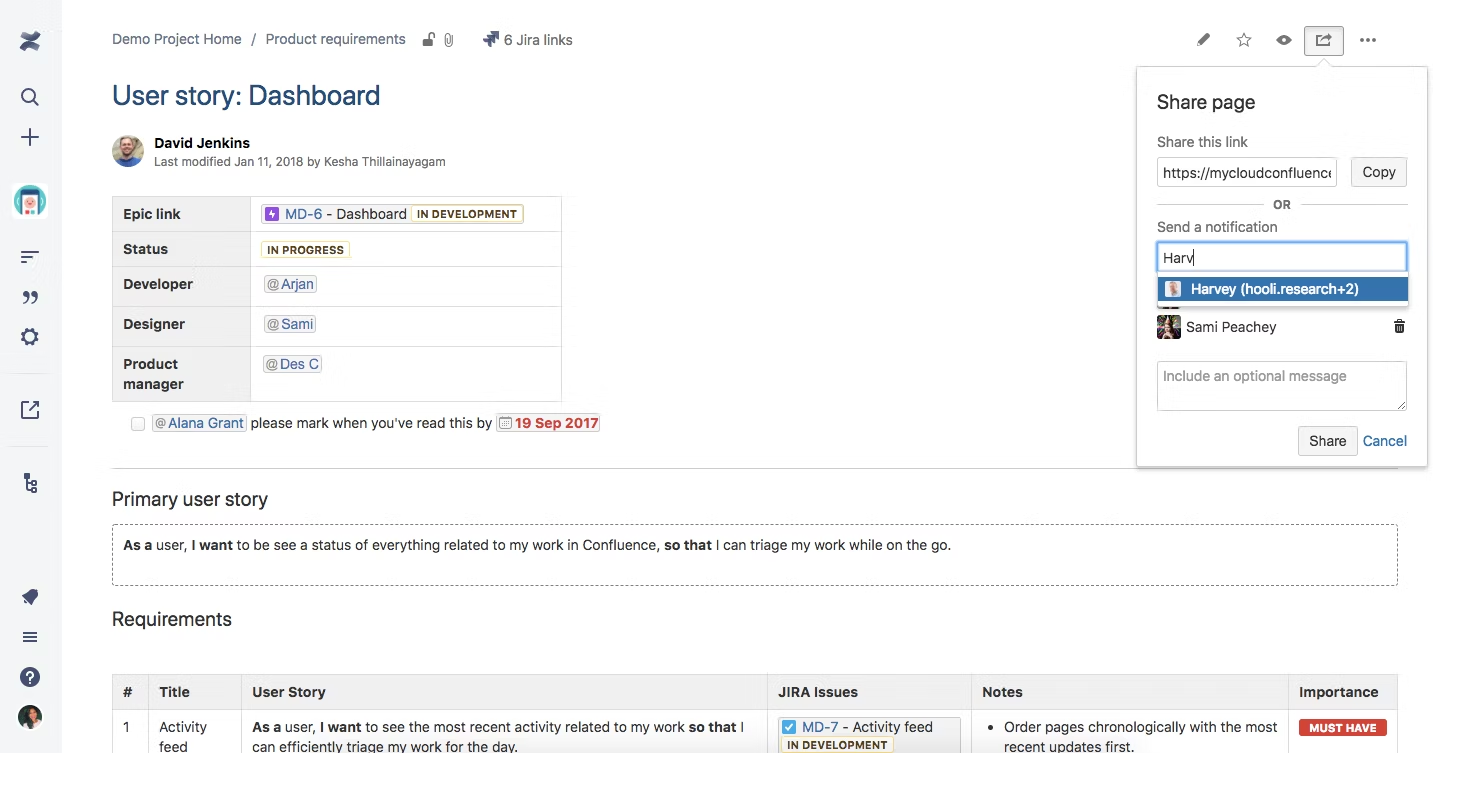
Confluence should be your choice if you’re aiming to streamline team collaboration and documentation.
With a focus on creating, organizing, and sharing content within your teams, Confluence simplifies the complicated task of keeping everyone on the same page.
While attending its demo, I was surprised at its user-friendly interface, meaning it can help your teams execute documents, project plans, and knowledge bases effortlessly.
Its seamless integration with Jira and other Atlassian tools enhances project management and issue tracking, facilitating efficient teamwork.
What you’ll like:
- Dedicated spaces for different teams to work on their projects, allowing for seamless connection across teams
- Detailed self-support articles for easier understanding of how to maximize your use of the available functions
- Seamless integration with products industry-standard like Microsoft Teams, Google Drive, Slack, and others
What you may not like:
- Advanced functionalities come with more expensive plans
- Some important features are only available as paid plugins
- Lack of third-party integrations like draw.io for diagram definition in real-time
Pricing:
A free plan with limited features is available. Paid plan starts from $5.75/user/month.
6. Panopto – Best for Video-Centric Knowledge Sharing

Panopto’s is one of the knowledge sharing platforms that specializes in creating, managing, and sharing video assets.
It offers detailed analytics to help you analyze the performance of your video content and identify knowledge gaps.
With Panopto, I could customize my knowledge base for easy and effective branding. It also offered other valuable features such as video tagging, screen recording, editing, subscriptions, etc.
Plus, Panopto’s mobile-friendly interface allowed my teams to access and share videos on the go!
What you’ll like:
- Multiple camera angles recording to record the presenter, presentation, and other visual angles to create engaging and interactive knowledge content
- Searchability for lectures for learners to look things up quickly
- Intuitive editing tools to snip the beginning and end or edit out sections in the middle of the video
What you may not like:
- Captions lack accuracy for industry-standard words
- More SCORM features could be there
- Delayed processing times after uploading
Pricing:
Starts from $14.99/user/month.
7. Tettra – Best for Smart Content Creation
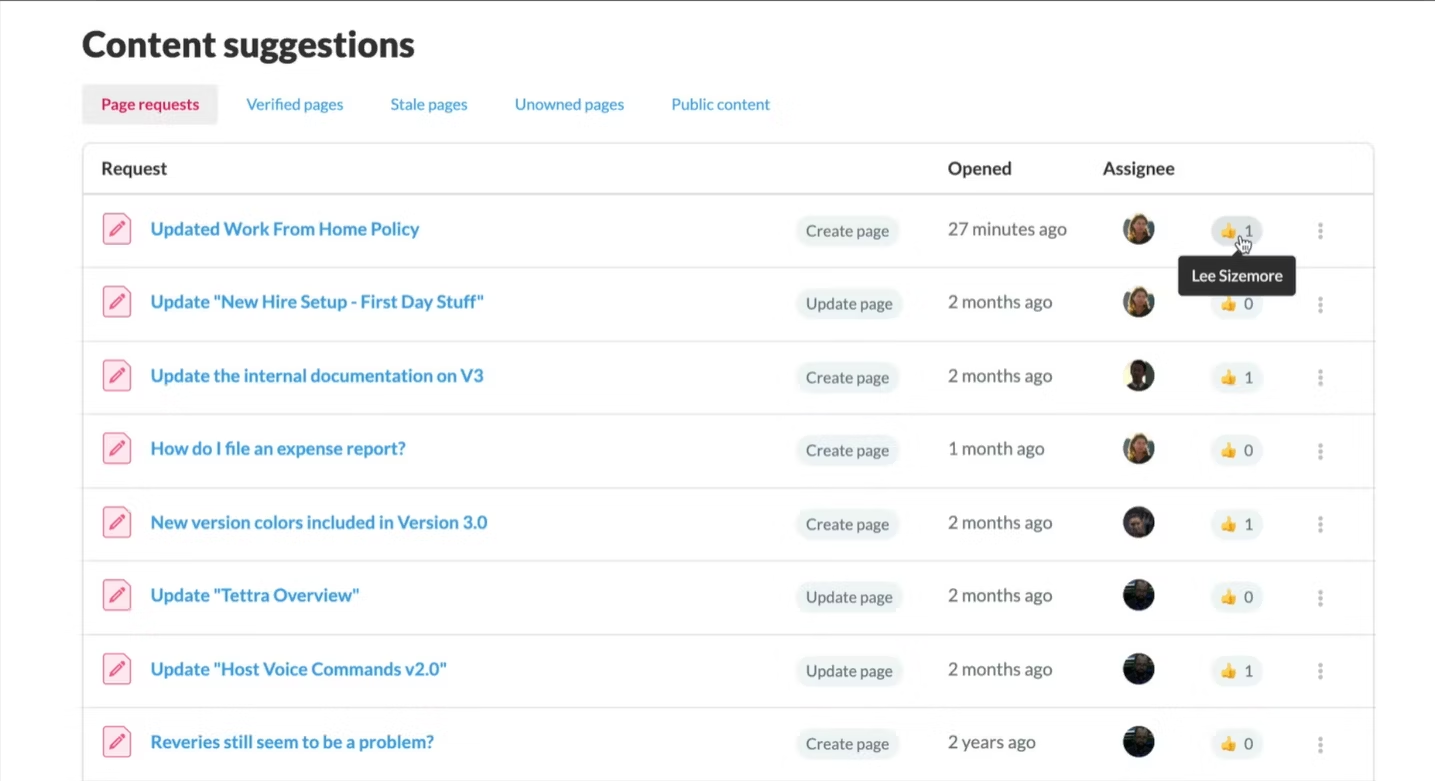
Tettra is a comprehensive knowledge base platform with a simple, non-clunky, easy-to-use editor. It provides you with monthly reporting to help you analyze the performance of your knowledge base articles and identify any gaps.
While researching and reading its many reviews and ratings, Tettra’s content suggestion feature stood out as it automatically identifies stale, public, or unowned content for timely cleanup.
It helps you curate essential company information into an internal knowledge base, use it to answer repetitive questions in Slack and MS Teams, and keep it up-to-date, organized, and complete with automation.
Its page request feature enables your teams to request new pages or page updates to fill the gaps.
What you’ll like:
- The simple text editor makes it easy to create and edit content
- Monthly reporting feature helps measure the performance of your articles
- Smart content suggestions help you make necessary updates to your knowledge base
What you may not like:
- Support is limited to specific hours, making it challenging to get support during off-hours
- Lack of a collaborative draft like Google Docs
- Less flexible formatting options
Pricing:
Paid plan starts from $4/user/month.
8. GitBook – Best for User-Friendly Documentation

GitBook is a modern and user-friendly documentation platform that allows you to document everything from product and service details to your company policies and processes.
GitBook lets you share content privately with your teams or non-GitBook users via a secret link. It also offers a rich text editor and customizable branding options to help you improve the appearance of your knowledge base.
I like its modern features like code snippets, markdown commands, integrations, and style branching to maximize productivity.
What you’ll like:
- Effortless to generate books as static website, PDF, and eBook
- Built-in shortcuts to make creating detailed, beautiful-looking documentation a breeze
- Seamless formatting and styling of text using markdown commands
What you may not like:
- More complicated interface than its competitors
- Shows the “Unexpected Error Occurred” message often when writing on a page with multiple images and media files
- Cannot resize drawings
Pricing:
A free plan is available. Paid plan starts from $6.70/user/month.
9. Notion – Best for a Minimalistic Workspace
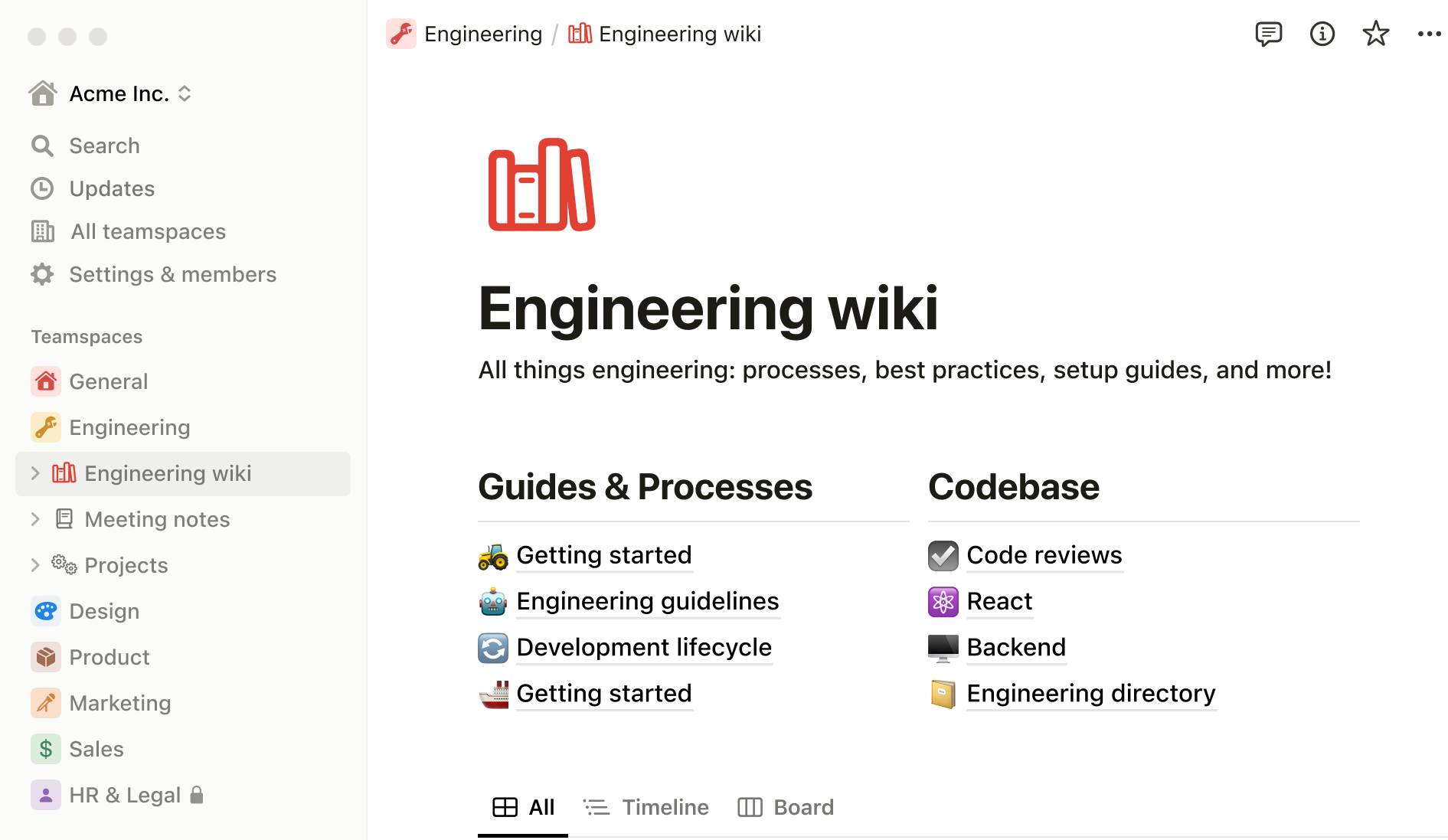
Notion is a flexible knowledge sharing platform that enables your people to manage projects, take notes, and share information seamlessly.
Its minimalist user interface and multiple pre-designed templates make content creation and knowledge sharing convenient.
Notion’s product demo was quite interactive!
I found that it offers a high level of customizability, enabling you to tailor your content and make it more engaging. Moreover, you can optimize your workflows by integrating Notion with third-party apps of your choice.
What you’ll like:
- Advanced permissions to give you complete control over user access
- Rich customization options help you to modify your content how you want
- Pre-built templates help you jump-start your content creation instantly
What you may not like:
- Difficult to format text/pages for a first-time user
- Lack of option for visualizing data – no real offline mode
- The app gets slower with more data or information stored
Pricing:
A free plan is available. Paid plan starts from $8/user/month.
10. Papyrs – Best for Creating an Online Intranet
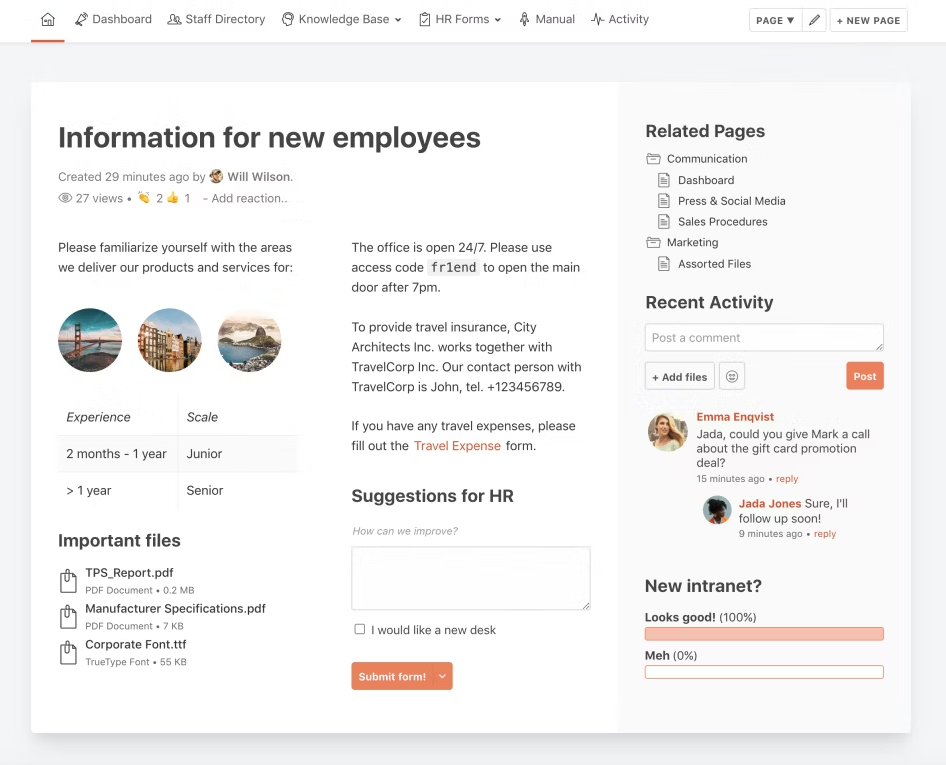
Papyrs is a robust internal knowledge sharing software for creating wikis, company intranets, and in-house knowledge bases. Its WYSIWYG (What You See Is What You Get) editor with rich formatting options helps you create clean and consistent content.
It also has a powerful, intelligent search function that instantly answers your questions.
During its demo, I liked being briefed about the tool’s permission and version control features, which allow you to choose which clients or users can view or edit your documents.
Papyrs integrates seamlessly with industry-standard apps like Slack, Google Workplace, Zapier, and other tools for improved team collaboration and workflow automation.
What you’ll like:
- Powerful search function lets you quickly find the documents you need
- Rich formatting options to help you create clean and clutter-free content
- Third-party integrations like Yapper, Slack, Dropbox, and more to help you improve productivity
What you may not like:
- Navigation through help pages is not very user-friendly
- The single sign-on and access for remote staff option occasionally glitches
- Limited customization options in basic plans
Pricing:
Paid plan starts from $1109/month/company.
Which is the Best Knowledge Sharing Platform for Your Business?
Regarding knowledge sharing platforms, it’s essential to remember that a tool that works for someone else won’t necessarily work for you.
While searching for the best knowledge sharing platform, look for features such as a rich text editor, in-depth reports, and third-party integrations. Remember to evaluate the tools on the ease of use and value for money.
Option #1 – ProProfs Knowledge Base
ProProfs Knowledge Base is a simple-to-use tool to set up even with no coding skills or specialized training. Its comment-based collaboration helps you supercharge your knowledge sharing using inline comments with other users.
Option #2 – Nuclino
Nuclino’s unified workspace works like a collective brain and helps you bring all your team’s work together. You can build a knowledge base, manage projects, take meeting notes, collaborate on technical documentation, and more.
Option #3 – Google Workspace
Google Workspace is a feature-rich tool for knowledge sharing and creating a knowledge base. It integrates a variety of apps such as Docs, Sheets, Slides, and more, which helps you collaborate in real time, share information, and create comprehensive documentation.
Based on my experience with striving to improve knowledge sharing and team collaboration, ProProfs Knowledge Base emerges as the clear winner. Its negligible learning curve and collaborative features like internal comments and intelligent roles assignment feature make it your go-to knowledge sharing software.
Regardless of your chosen tool, consider going for a free trial and a personalized demo to get a first-hand experience of using different features and functions.
To help you with other questions, I have added some FAQs below.
FAQs
What is an example of a knowledge sharing platform?
An example of a robust knowledge sharing platform is ProProfs Knowledge Base. It enables real-time collaboration, version control, and internal comments for effortless knowledge sharing.
What are the types of knowledge sharing systems?
Different knowledge sharing systems exist, such as document management systems, content management systems, and social knowledge platforms.
These systems differ in focus and functionality, but all aim to seamlessly facilitate information sharing within an organization.
FREE. All Features. FOREVER!
Try our Forever FREE account with all premium features!







